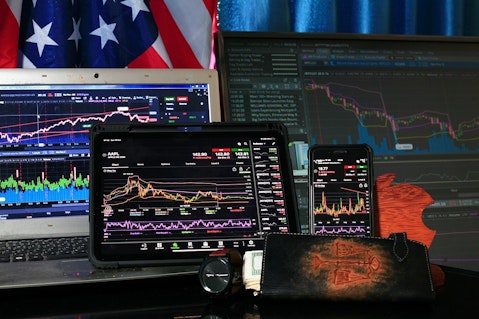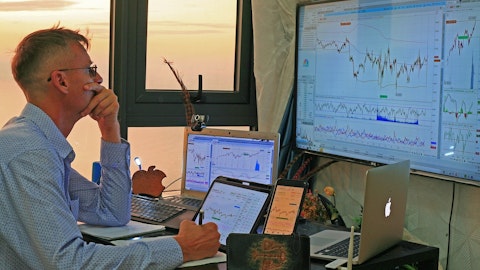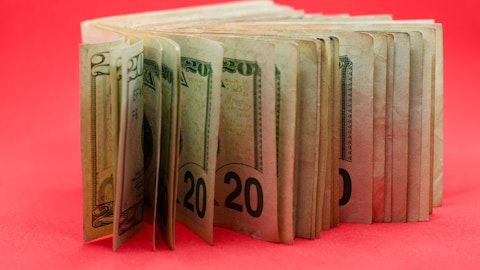In this article, we will take a look at the 10 stocks receiving a massive vote of approval from Wall Street analysts.
European equities faced challenges in extending recent gains seen in the US, as market participants awaited new drivers for momentum. US equity futures remained stable in subdued holiday trading conditions following another record-breaking session for major indices, buoyed by strong performances in technology stocks, particularly in artificial intelligence sectors. Conversely, the broader European Stoxx 600 edged lower by 0.2%, stepping back after consecutive days of modest gains, amid ongoing concerns over political tensions in France.
Bond yields across the eurozone saw marginal increases, reflecting cautious investor sentiment. Meanwhile, the Brazilian real came under pressure ahead of an imminent central bank rate decision. In monetary policy news, Federal Reserve officials reiterated a patient stance on potential interest rate adjustments, highlighting the need for sustained evidence of easing inflationary pressures. Fed Governor Adriana Kugler suggested that a rate cut could be appropriate “sometime later this year,” contingent upon economic developments aligning with expectations. St. Louis Fed President Alberto Musalem echoed this sentiment, emphasizing the importance of data confirming a conducive economic environment over multiple quarters.
Turning to commodities, oil prices retreated from recent highs as reports indicated a build-up in US crude inventories, dampening optimism despite ongoing strength in equity markets. Brent crude declined towards $85 per barrel after earlier touching its highest level since early May, while West Texas Intermediate held steady above $81 per barrel. The American Petroleum Institute’s data pointed to a third consecutive weekly increase in US crude stockpiles, with additional rises noted at major storage facilities like Cushing, Oklahoma. Overall, market participants navigate a landscape characterized by cautious optimism amid lingering uncertainties. The focus remains on economic data releases and geopolitical developments, which are expected to provide clarity and direction for global markets in the days ahead.
U.S. retail sales in May showed marginal growth, with the Commerce Department reporting a modest 0.1% increase, which was downwardly revised from April’s figures. This subdued uptick suggests that economic activity in the second quarter remained lackluster. Analysts caution that the reported slowdown in retail sales might be somewhat exaggerated due to lower gasoline prices, which dragged down receipts at service stations. According to Reuters, the broader economic landscape is being shaped by persistent inflationary pressures and rising interest rates, factors that are increasingly influencing consumer behavior. Many households are focusing on essential purchases while scaling back on non-essential spending, reflecting a cautious approach amidst economic uncertainties. Economists view the tepid retail sales data as bolstering the case for a potential interest rate cut by the Federal Reserve in September, despite the central bank’s recent decision to delay rate adjustments until later in the year.
In contrast to the subdued retail sector, manufacturing production surged 0.9% in May, rebounding strongly from April’s decline. This uptick in manufacturing output, particularly in durable goods and nondurable goods sectors, signals a potential revival in industrial activity. However, economists remain cautious about the sustainability of this recovery, citing concerns over high interest rates dampening business investment and a strong U.S. dollar limiting demand for manufactured goods in global markets. Overall, while retail sales paint a cautious consumer spending picture, the rebound in manufacturing production offers a glimmer of optimism for economic growth in the coming months, albeit amidst a backdrop of ongoing uncertainties and policy considerations by the Federal Reserve.
The Bank of England is poised to maintain its current interest rates despite headline inflation hitting the targeted 2% mark, marking a significant achievement not seen in nearly three years. Traders are increasingly convinced that an immediate rate cut is unlikely, with only a minimal 5% probability priced into money markets for a reduction during Thursday’s BOE meeting, down from earlier forecasts. Anticipation for an August rate cut has also eased to around 30%. While the 2% inflation milestone is noteworthy, driven largely by declining energy prices, market attention remains on services inflation, which exceeded expectations at 5.7%. Core inflation, excluding volatile components like energy and food, remained elevated at 3.5%, well above the central bank’s preferred target. James Sproule, chief economist at Handelsbanken, emphasized that while recent seasonal factors have contributed to easing food prices, the outlook for the rest of the year suggests potential inflationary pressures could re-emerge, especially in services inflation linked closely to wage dynamics. The Bank of England, keeping a watchful eye on economic indicators amidst an impending national election, faces a delicate decision on future rate cuts. Despite encouraging inflation readings, concerns persist over stubbornly high wage growth, which stood at 6% excluding bonuses in June, complicating monetary policy decisions. Looking ahead, analysts speculate whether the BOE will opt for a rate adjustment in August or September, closely monitoring liquidity conditions and any shifts in economic sentiment post-election. Governor Andrew Bailey’s recent comments suggest a cautious optimism in the central bank’s inflation forecasts, aligning with a similar stance taken by the European Central Bank in its recent policy adjustments.

10 Stocks Receiving a Massive Vote of Approval From Wall Street Analysts
In this article we listed 10 companies that were upgraded by analysts and ranked them by the change in their market prices. Positive changes signal that the market participants agree with the analysts’ assessment.
10. Capri Holdings Limited (NYSE:CPRI)
Price Reaction after the Upgrade: -0.27(-0.84%)
On June 17, Citi analysts upgraded Capri Holdings Limited (NYSE:CPRI), a prominent player in the global luxury fashion industry, from a “Neutral” rating to a “Buy.” This upgrade was based on the analysts’ belief in the substantial upside potential of Capri Holdings Limited (NYSE:CPRI), irrespective of its ongoing acquisition by Tapestry, Inc. (NYSE:TPR). Capri Holdings Limited (NYSE:CPRI), which owns renowned brands such as Michael Kors, Versace, and Jimmy Choo, has demonstrated strong independent growth potential that warrants this upgraded rating. Tapestry, Inc., another key entity in the luxury fashion market with brands like Coach, Kate Spade, and Stuart Weitzman, announced its plans in 2023 to acquire Capri Holdings for $8.5 billion. This acquisition aims to form a robust luxury conglomerate, enhancing market reach and diversifying its brand portfolio. Despite the announcement of this significant merger, Citi’s upgrade suggests a confident outlook on Capri Holdings Limited (NYSE:CPRI) strategic direction, brand equity, and market opportunities as an independent entity. This confidence is seen as a compelling reason for investors to consider Capri Holdings a valuable addition to their portfolios in the luxury fashion sector. Following the upgrade by Citi analysts, the stock price of Capri Holdings Limited (NYSE:CPRI) experienced a slight decline of 0.84%, reflecting the market’s immediate reaction. However, the upgrade underscores the long-term investment appeal of Capri Holdings Limited (NYSE:CPRI), highlighting its strong positioning and growth prospects within the luxury fashion industry.
Alger Small Cap Growth Fund made the following comment about Capri Holdings Limited (NYSE:CPRI) in its Q3 2023 investor letter:
“Capri Holdings Limited (NYSE:CPRI) is a global fashion retailer with over 1,300 stores around the world. The company operates a portfolio of luxury handbags and other accessories, including Michael Kors, Versace and Jimmy Choo. During the period, shares contributed to performance after the company received a cash offer from its closest competitor, Tapestry, Inc., the owner of Coach, Kate Spade and Stuart Weitzman, for $57 per share or a 63% premium to where the stock was trading on the day it was announced. The deal has been approved by the company’s board. We believe there is minimal regulatory risk related to the deal and expect the deal to close by the end of the calendar year.”
09. Sunoco LP (NYSE:SUN)
Price Reaction after the Upgrade: -0.16(-0.29%)
On June 18, Citi analysts upgraded Sunoco LP (NYSE:SUN) from “Neutral” to a “Buy” rating, reflecting their optimism about the company’s growth prospects within the energy sector. The upgrade was driven by several positive factors, including Sunoco LP (NYSE:SUN) robust fundamentals, strong market position, and appealing valuation. Citi highlighted that improvements in the broader energy market, coupled with Sunoco LP (NYSE:SUN) strategic initiatives, are expected to bolster the company’s profitability and enhance returns for investors. Citi’s analysis pointed to Sunoco LP (NYSE:SUN) solid financial foundation and strategic market positioning as key reasons for their upgraded rating. Additionally, the energy sector’s recent advancements and Sunoco LP (NYSE:SUN) proactive strategies aimed at increasing efficiency and expanding market share were seen as critical drivers of future growth. Following this upgrade, the stock price of Sunoco LP (NYSE:SUN) saw a slight decrease of 0.29%, reflecting the immediate market reaction. Despite this minor dip, Citi’s upgrade underscores a positive outlook on Sunoco LP (NYSE:SUN) performance and potential within the current market environment, making it an attractive consideration for investors looking at the energy industry.





